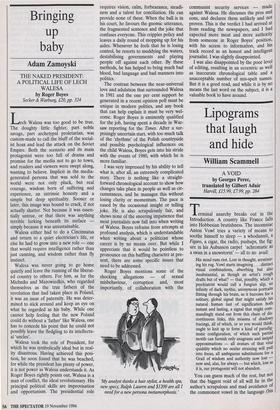Bringing up baby
Adam Zamoyski
THE NAKED PRESIDENT: A POLITICAL LIFE OF LECH WALESA by Roger Boyes Secker & Warburg, f20, pp. 324 Lech Walesa was too good to be true. The doughty little fighter, part noble savage, part archetypal proletarian, was custom-made to call the bluff of the social- ist hoax and lead the attack on the Soviet Empire. Both the scenario and its main protagonist were too full of drama and promise for the media not to go to town, and readers and viewers were swept along, wanting to believe. Implicit in the media- generated persona that was sold to the world were not only pluck, but real courage, wisdom born of suffering and experience, an intrinsic honesty and a simple but deep spirituality. Sooner or later, this image was bound to crack, if not actually shatter. Not because it was essen- tially untrue, or that there was anything terrible lurking beneath its surface simply because it was unsustainable.
Walesa either had to do a Cincinnatus and return to a quiet electrician's life, or else he had to grow into a new role — one that would require intelligence rather than just cunning, and wisdom rather than fly instinct.
Walesa was never going to go home quietly and leave the running of the liberat- ed country to others. For him, as for the Michniks and Mazowiedkis, who regarded themselves as the true fathers of the revolution that had taken place in Poland, it was an issue of paternity. He was deter- mined to stick around and keep an eye on what he regarded as his baby. While one cannot help feeling that the new Poland could do without a 'father' like Walesa, one has to concede his point that he could not possibly leave the fledgling to its intellectu- al 'uncles'.
Walesa took the role of President, for which he was symbolically ideal but in real- ity disastrous. Having achieved this posi- tion, he soon found that he was beached, for while the president has plenty of power, it is not power as Walesa understands it. As Roger Boyes rightly points out, Walesa is a man of conflict, the ideal revolutionary. His principal political skills are improvisation and opportunism. The presidential role requires vision, calm, forbearance, steadi- ness and a talent for conciliation. He can provide none of these. When the ball is in his court, he favours the gnomic utterance, the fragmented sentence and the joke that confuses everyone. This cripples policy and leaves a daily round of mopping up for his aides. Whenever he feels that he is losing control, he resorts to muddying the waters, destabilising governments and playing people off against each other. By these methods, he has helped to bring much bad blood, bad language and bad manners into politics.
The contrast between the near-universal love and adulation that surrounded Walesa in 1981 and the one per cent support he generated in a recent opinion poll must be unique in modern politics, and any book that can help explain it must be very wel- come. Roger Boyes is eminently qualified for the job, having spent a decade in War- saw reporting for the Times. After a sur- prisingly uncertain start, with too much talk of the 'rhythms' of the Polish countryside and possible psychological influences on the child. Walesa, Boyes gets into his stride with the events of 1980, with which he is more familiar.
I was very impressed by his ability to tell what is, after all, an extremely complicated story. There is nothing like a straight- forward chronological account to show how changes take place in people as well as cir- cumstances, and he manages this without losing clarity or momentum. The pace is eased by the occasional insight or telling joke. He is also scrupulously fair, and shows none of the sneering impatience that most journalists now fall into when writing of Walesa. Boyes refrains from attempts at profound analysis, which is understandable when writing about a politician whose career is by no means over. But while I appreciate that it would be pointless to pronounce on this baffling character at pre- sent, there are some specific issues that need to be addressed.
Roger Boyes mentions some of the shocking allegations — of sexual misbehaviour, corruption and, most importantly, of collaboration with the My analyst thinks a hair stylist, a health spa, new specs, Ralph Lauren and $1200 are all I need for a new persona metamorphosis.' communist security services — made against Walesa. He discusses the pros and cons, and declares them unlikely and not proven. This is the verdict I had arrived at from reading the newspapers, and I had expected more meat and more authority from someone in Roger Boyes' position, with his access to information, and his track record as an honest and intelligent journalist. I was slightly disappointed. I was also disappointed by the poor level of editing, resulting in an eccentric as well as inaccurate chronological table and a unacceptable number of mis-spelt names. But it is a good read, and while it is by no means the last word on the subject, it is a valuable book to have around.


















































































 Previous page
Previous page